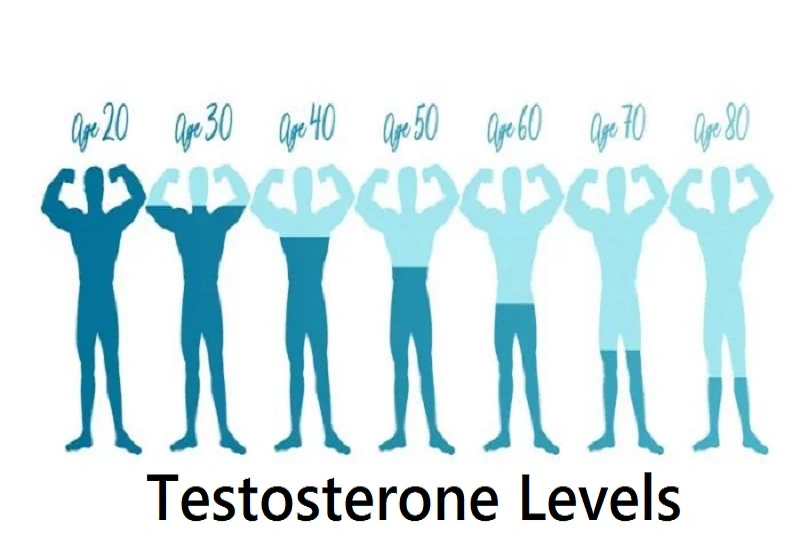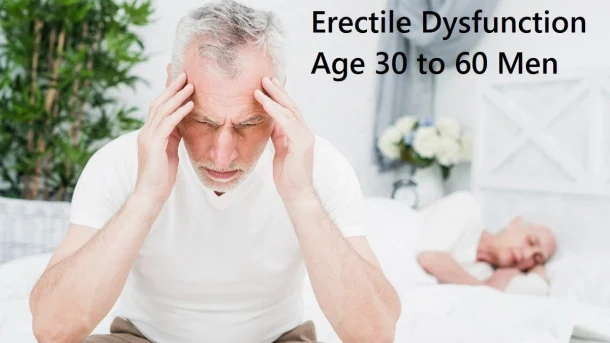How does erectile dysfunction age between 30 to 60 occur in men and what is its treatment? In this article have been explained, erectile dysfunction by age, its causes, and treatment.
Is Erectile Dysfunction Inevitable As You Get Older?
Erectile dysfunction (ED) is the inability to obtain or maintain a hard, adequate erection for sexual intercourse.
Some people believe that ED worsens with age, and the difficulty of maintaining an erection isn’t necessarily tied to age.
Aging does not guarantee that you will acquire ED eternally. While aging might increase the risk of ED. Men’s health medications are effectively used for ED treatment.
Erectile dysfunction might indicate a medical or psychological problem, leading to stress, relational difficulty, and low self-esteem.
The major symptom is a man’s inability to obtain or maintain a hard, adequate erection for sexual intercourse.
Patients with erectile dysfunction should first be assessed for underlying medical and psychological disorders.
Male sexual function is comprised of the following components:
- The urge and interest in sexual activities (libido).
- The capacity to get and keep an erection.
- The capacity to climax and ejaculate (orgasm).
During our initial ED examination, doctor always investigate and rule out medical reasons for these symptoms.
Diabetes, cardiovascular and renal disease, high blood pressure, high cholesterol, and low testosterone are common medical or physical factors for older men (over 40).
For these reasons, ED therapy focuses on addressing these medical issues first.
What Age Does a Man Stop Getting A Hard On?

As men age, erectile dysfunction may occur more frequently, but it’s not just a natural part of aging. About 40% of men are affected by erectile dysfunction by the age of 40, and about 70% of men are affected by ED by the age of 70.
Erectile Dysfunction Age at 30 Year Older Men’s
Erectile dysfunction can be challenging to deal with at the age of 30. No guy, especially a young one, wants to cope with diminished sexual function. To suggest it can impact your quality of life is an understatement.
Many young men with ED may believe these symptoms are unfathomable for someone their age. However, roughly 20% of men in their twenties and 30% in their thirties have at least mild to moderate ED symptoms.
The major causes of performance anxiety during sex include a new partner, increased everyday life pressures, and undiagnosed and untreated anxiety and depression. City Care Family Practice’s physicians can assist you in beginning treatment for anxiety and depression.
Developing appropriate coping techniques, utilizing friends and family support systems, seeing a therapist, and taking medication can all aid in treating these disorders and, eventually, ED.
Erectile dysfunction Age 40
“Erectile dysfunction age 40s” might indicate a major health problem, such as heart disease, or it can be a side effect of the medicine you’re taking. Speaking with a healthcare expert will assist you in determining the source of your problem and the best way to resolve it.
How common is erectile dysfunction in 40s?
The study found that ED becomes more common with age, with around 40% of men afflicted at age 40 and over 70% of men affected at age 70. The frequency of complete ED rose from 5% at the age of 40 to 15% at 70.
The characteristic most significantly related to ED was age. It is natural to experience erectile dysfunction age 40, but you do not have to accept it. Your sexual life does not have to be hampered by ED. Find help for your erectile dysfunction at 40-year-old guy looking for interesting, gratifying sex life.
It is natural to experience ED at any age, including 40, but you do not have to accept it. Your sexual life does not have to be hampered by ED. Find help for your ED if you are a 40-year-old guy looking for interesting, gratifying sex life.
Erectile Dysfunction at 50
Erectile Dysfunction at 50 aged men is widespread and can be the first sign of a significant underlying health problem such as heart disease or diabetes. Atherosclerosis, or artery hardening, is the most prevalent cause of erectile dysfunction in males over the age of 50. Medication usage, obesity, anxiety, and sleep difficulties are all possible reasons. Diet, exercise, and stopping smoking are all lifestyle modifications that can help manage the underlying illness and improve your ED.
How common is Erectile Dysfunction in 50s?
You are not alone if you are over 50 and experience erectile dysfunction (ED). It is the most common type of sexual dysfunction among males, which may indicate a more significant health concern for individuals. Continue reading to discover more about the causes of ED in men over 50 and what you can do about it.
“Atherosclerosis“, or the buildup of plaque in the arteries or hardening of the arteries, is the most prevalent cause of “erectile dysfunction at 50 aged men”. This syndrome can affect any artery in the body and is frequently associated with heart disease. It can, however, damage the blood vessels in the penis that are important for erections.
The linings of men’s arteries grow less flexible as they age. That is, they do not expand as easily to allow more blood to flow through as needed (like while getting an erection). Plaque accumulation can also restrict arteries, allowing less blood to travel to the penis. This decreased blood flow might result in ED, heart attacks, or strokes.
Erectile Dysfunction Age 60
However, erectile dysfunction age of 60, the incidence rose regardless of comorbidities such as coronary artery disease, diabetes, or hypertension. Furthermore, elderly men are frequently afflicted with several ailments and use numerous medicines, many of which have the potential to impair sexual performance. On the other hand, maintaining sexuality in both senior men and women is notable for attempting to improve their quality of life.
At what age do guys have trouble getting hard?
Erectile dysfunction is widespread in the age 60 because it is related to the same underlying risk factors as vascular disease, which include hypertension, diabetes mellitus (DM), hyperlipidemia, smoking, and obesity. Some data suggests that ED can be considerably improved by medications such as phosphodiesterase inhibitors (PDE5-I) and by directly addressing the risk factors.
Is there a link between ED, age, and endothelial dysfunction (EDys)?
Minor “risk factors for ED” and EDys include inflammation, hypoxia, oxidative stress, and hyperhomocysteinemia. Organic causes of ED account for up to 80% of patients, with vascular disease being the most frequent etiology of ED.
The findings revealed that age was the most critical factor in males who claimed to have ED. The older the guys get, the more ED complaints they have. The reports ranged from “excellent” function among younger males to “poor” performance among the elderly.
Younger men (74 percent) assessed their sexual function as good or very good, whereas just 10 percent of men over the age of 80 did. Only 12% of younger men reported major or minor issues. However, approximately a quarter to a third of men over the age of 50 reported this level of sexual dysfunction.
Erectile Dysfunction By Age
- 2% had their first episode of “ED before the age of 40”.
- 4% reported first experiencing “ED between the ages of 40 and 49”.
- Between the “ages of 50 and 59, 26 percent developed ED” for the first time.
- 40% first developed “ED between the ages of 60 and 69”.
What causes Erectile Dysfunction?
Various physical factors can cause ED, and any of these can disturb the physiological processes leading to an erection.
- Obesity
- Diabetes and cardiovascular disease.
- Hypertension (high blood pressure).
- I have elevated cholesterol levels.
- Sleep problems caused by insufficient testosterone, such as sleep apnea,
- MS (multiple sclerosis).
- Parkinson’s disease (PD).
- The hormone testosterone influences sexual desire and energy levels, which control arousal impulses to the brain.
What are Other causes of ED?
ED is not always associated with age or chronic conditions.
Other typical reasons include excessive alcohol intake, cigarette usage, and the use of prescription drugs.
Anxiety depression
Alcohol delays nerve transmission in the brain and body, affecting arousal signals and muscular coordination.
Tobacco inhibits blood flow and can cause significant disorders that may damage sexual function further.
Does Levels of Testosterone Cause Erectile Dysfunction?
“Testosterone” is a hormone that serves numerous roles in the body. It aids in numerous areas of male sexual health, including controlling sex drive and preserving the tissues that provide blood to the penis.

As people become older, their testosterone levels tend to drop. This may result in a decrease in sex drive, which may contribute to ED. It may also cause scarring in the vein network of the penis, reducing blood flow to that location.
What is Treatment of Erectile Dysfunction Age 30 to 60 in men?
When treating erectile dysfunction age 30 to 60 men’s doctors often recommend a combination of lifestyle changes and medications.
1) Lifestyle Changes
Doctors may advise you to make changes in your lifestyle to help minimize or improve your Erectile Dysfunction.

The following changes in lifestyle may aid in the treatment or prevention of ED:
- Quit smoking
- Limit or stop drinking alcohol
- Increase physical activity and maintain a healthy body weight
- Stop illegal drug use
- eating a healthful diet
If you are having difficulty adopting these changes on your own, you might seek the assistance of a health expert.
A lack of sexual desire might also contribute to ED in older men. According to a 2020 study, an estimated 82.4% of males aged 80 and up lack sexual interest. One approach for improving sexual desire and reducing ED symptoms is to get treatment from a sex therapist.
2) Oral Medications
To help you achieve and maintain an erection, your doctor may give you an oral prescription medicine you take by mouth, such as the following:
1) Sildenafil (Viagra)
2) Tadalafil (Cialis)
3) Avanafil (Stendra)
4) Vardenafil (Levitra)
During sexual stimulation, all of these ED medications function by relaxing smooth muscles and boosting blood flow in the penis. If you are using nitrates for a cardiac issue, you should not use any of these ED medications.
Nitrates dilate and relax the blood vessels. The combination might induce an abrupt drop in blood pressure, which can cause you to faint or dizzy, or cause you to fall, potentially injuring yourself.
3) Testosterone Replacement
“ED is frequently caused by acute stress or chronic cardiovascular conditions that reduce blood flow to the penis.” “However, low testosterone can contribute to problems forming and maintaining an erection, your doctor can help you learn whether your testosterone levels are low and whether beginning testosterone medication may help ease your ED symptoms.
Though testosterone replacement therapy is not indicated as a first-line, stand-alone treatment for ED, your doctor may offer it or try it in conjunction with another ED treatment option based on your specific symptom profile.
Conclusion
Erectile dysfunction aged 30 to 60 can be an awkward topic to discuss, especially with aged men. However, keep in mind that you are not alone and that help is available. Millions of other men face the same problem, and ED is a treatable disorder.
It is critical to get treatment for ED because it may be a symptom of other health issues. Treating the condition fast with your doctor can lead to more rapid and satisfying solutions.



